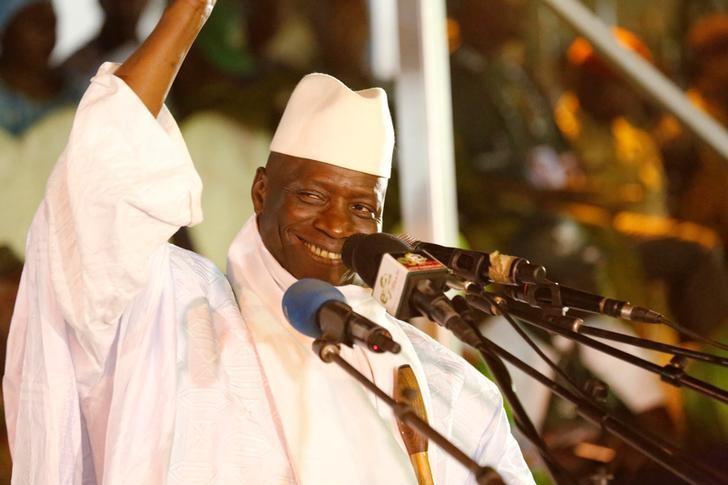- AU Joins ECOWAS to Pressure Jammeh
An African Union (AU) delegation is on its way to Gambia, to persuade outgoing President Yahya Jammeh to accept his loss in the country’s December’s election.
The AU “strongly rejects any attempt to circumvent or reverse the outcome of the presidential election held in the Gambia, a clear expression of the popular will and choice of the Gambian people,’’ the organisation said in a statement.
The visit comes several days after Jammeh announced his intention to challenge the election results, which declared opponent Adama Barrow the winner.
According to Amie Bojang, the spokeswoman of Gambia’s opposition coalition the delegation includes: Liberia’s President Ellen Johnson Sirleaf, who also chairs the Economic Commission of West African State (ECOWAS).
Others are; the Sierra Leone’s President Ernest Bai Koroma, President Alpha Conde of Guinea and the Nigerian President, Muhammadu Buhari.
The delegation is also expected to conduct talks with the president-elect and members of the opposition coalition, which supported Barrow’s bid for the presidency.
On Monday, Gambia’s coalition of seven opposition parties demanded Jammeh to “immediately step down and hand over power’’.
Newly elected President Barrow was initially supposed to take power in January.
Jammeh, who has ruled the West African country for 22 years with an iron fist, had earlier conceded defeat to Barrow, but then deployed heavily armed military and police to the streets of the capital Banjul.
President Muhammadu Buhari, his Liberian and Ghanaian counterparts, Ellen Johnson-Sirleaf and John Mahama, will on Tuesday, leave for Banjul to put diplomatic pressure on President Yahya Jammeh to transfer power to President-elect Adama Barrow.
The UN Security Council made the plan known while briefing newsmen after a closed-door meeting by the 15 members on the political situation in The Gambia.
Mr Juan Manuel De Linares, Deputy Permanent Representative of Spain, said the members of the council stood by their unanimous statement on Dec. 10 that Jammeh should commence the peaceful transfer of power to Barrow without further delay.
“A delegation by the Special Representative of the UN Secretary-General to ECOWAS (Mohammed Ibn Chambas) and other ECOWAS and AU leaders will lead high-level delegation to Banjul tomorrow.
“The delegation will include the President of Nigeria (Buhari), Liberia (Johnson-Sirleaf), Ghana (Mahama). These are respected presidents in West Africa and Africa,” Linares said.
He, however, said that the council did not discuss any measure that would be taken should Jammeh refuse the entreaties.
“Our priority is to support the high-level visit tomorrow and ensure the mission succeeds,” he said.
He urged all parties in The Gambia to reject any form of violence and ensure peaceful transition of power in the West African country.
Amb. Ismael Martins, Permanent Representative of Angola to the UN, also told the News Agency of Nigeria (NAN) that the high-level visit was an effort of the ECOWAS leaders.
“The purpose of the visit of the ECOWAS leaders is to keep everybody in agreement to arrive at transfer of power in accordance to the rules of AU and ECOWAS.
“There is a high-level delegation of Heads of State going to visit Gambia, comprising the President of Liberia as the Head of ECOWAS and other respected heads of state in the ECOWAS sub-region,” Martins said.
In a statement on Saturday, the Security Council “strongly condemned the outgoing Gambian president’s rejection of the official election results proclaimed by the country’s Independent Electoral Commission”.
The council asked Jammeh “to respect the choice of the sovereign people of Gambia, as he did on Dec. 2, and to transfer, without condition and undue delay, power to the President-elect, Mr Adama Barrow”.
It also urged all parties to exercise maximum restraint, refrain from violence and remain calm, and requested that the security of Barrow and that of all Gambians be fully ensured.
The council also urged support by the UN Office for West Africa and international partners, especially ECOWAS, to preserve stability in The Gambia and work toward the installation of a democratically elected government in the country.
The council commended The Gambian people for the peaceful and transparent conduct of elections on Dec. 2 and expressed commitment to continue to closely follow the evolution of the situation in the country.
The council recalled the relevant provisions of Article 23 (4) of the AU Charter on Democracy, Elections and Governance.
NAN


 Forex3 weeks ago
Forex3 weeks ago


 Naira2 weeks ago
Naira2 weeks ago
 Billionaire Watch2 weeks ago
Billionaire Watch2 weeks ago




 Naira2 weeks ago
Naira2 weeks ago




 Naira2 weeks ago
Naira2 weeks ago




 Naira1 week ago
Naira1 week ago




 Naira4 weeks ago
Naira4 weeks ago




 Naira3 weeks ago
Naira3 weeks ago





















